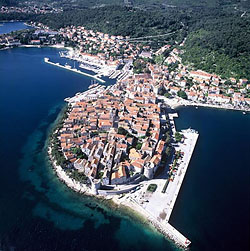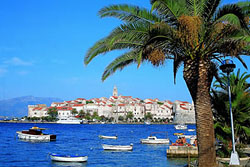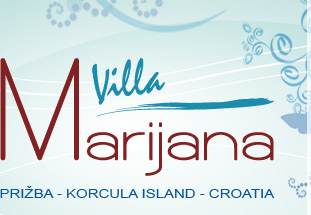Korčula
 The town of Korcula, the historical centre of the island, has a very nice location in the Peljesac Channel. It is also known for its outstanding cultural and historical heritage and a long tradition in seafaring, shipbuilding and stone-masonry. It is the birthplace of the adventurer and traveller Marco Polo. Today Korcula is an important tourist centre. Tourism has a years-long tradition on the island. The first modern hotel, Korcula, was opened in 1912, in a building erected in 1871. Hotel guests have been enjoying the sunset at the hotel terrace for decades, which is a unique experience in the early summer.
The town of Korcula, the historical centre of the island, has a very nice location in the Peljesac Channel. It is also known for its outstanding cultural and historical heritage and a long tradition in seafaring, shipbuilding and stone-masonry. It is the birthplace of the adventurer and traveller Marco Polo. Today Korcula is an important tourist centre. Tourism has a years-long tradition on the island. The first modern hotel, Korcula, was opened in 1912, in a building erected in 1871. Hotel guests have been enjoying the sunset at the hotel terrace for decades, which is a unique experience in the early summer.
Visitor opportunities of the island of Korcula include various types of accommodation - hotels, apartments, campsites, marina; sports and recreational facilities, especially interesting are water sports; organized excursions and a rich cultural life and entertainment programs. Cultural events of "Moreska" and "Kumpanija" have become world-famous. Gastronomic offer includes famous fish specialities and exquisite, top-class local wines (Posip, Rukatac, Grk, Plavac), due to which Korcula is also called "the island of wines". The local cuisine is also famous for traditional cakes and sweets, such as "cukarini", "krostule" and "prikle".
Korcula has numerous tennis courts. Windsurfing and yachting equipment may be rented. Interesting excursions are one-day or longer sailing or yachting tours and diving expeditions led by professional divers.
 The most important cultural event is the traditional chivalrous game called "Moreska". It has been performed in Korcula since the 15th century and is of Spanish origin. It is a battle between the army of the White King and the army of the Black King, who fight for the princess abducted by the Black King. After a fierce fight with swords, in seven battle figures and a dramatic dialogue, the White King defeats the Black King and sets the princess free. The fight is accompanied by a battle march performed by a brass band.
The most important cultural event is the traditional chivalrous game called "Moreska". It has been performed in Korcula since the 15th century and is of Spanish origin. It is a battle between the army of the White King and the army of the Black King, who fight for the princess abducted by the Black King. After a fierce fight with swords, in seven battle figures and a dramatic dialogue, the White King defeats the Black King and sets the princess free. The fight is accompanied by a battle march performed by a brass band.
Moreska is performed every year on the 29th of July, together with the celebration of St. Todor, but also on several occasions during the tourist season.
Other traditional feasts in Korcula include the carnival, which starts on the Epiphany, and the Holy Week, with the procession of guilds - especially impressive is the procession on Good Friday. -Other religious feasts are the day of Sts. Peter and Paul (29th of June) with bonfires, the festivities of the Assumption of Our Lady (15th of August) and the feast of St. Martin, with baptizing of young wine (in November). Many cultural and sports events take place during the summer months: music festivals, theatre and folk music performances, sports contests, yachting regattas, etc.
Korcula ACI Marina has 220 berths in the sea and 100 places on the ground.
